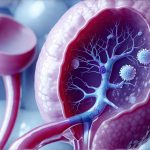The Complex Connection Between Gluten and Urinary Symptoms
Urinary symptoms – frequency, urgency, pain, discomfort – are incredibly common, impacting millions worldwide. Often dismissed as minor inconveniences, they can significantly disrupt daily life and sometimes signal underlying serious conditions. While many associate urinary issues with infections, prostate problems (in men), or gynecological concerns (in women), a growing body of evidence suggests a less-obvious culprit may be at play for some individuals: gluten. This isn’t to say gluten causes all urinary issues, but rather that in specific circumstances, particularly those involving sensitivities or autoimmune responses, it could contribute to or exacerbate these symptoms. Understanding this potential link requires exploring the intricate relationship between gut health, inflammation, and the body’s overall immune response.
The connection is far from straightforward. Gluten isn’t directly excreted by the kidneys, so its impact on urinary function isn’t immediately obvious. The pathway involves a more complex interplay between the digestive system, immune system, and nervous system. For individuals with celiac disease or non-celiac gluten sensitivity (NCGS), consuming gluten triggers an inflammatory response that can extend beyond the gut. This systemic inflammation can impact various organs and systems, potentially affecting bladder function and nerve pathways controlling urination. Furthermore, the gut microbiome – the trillions of bacteria residing in our intestines – plays a crucial role in overall health, including immune regulation. Gluten can disrupt this delicate balance, leading to dysbiosis (an imbalance in gut bacteria) which further fuels inflammation and impacts neurological function. In fact, understanding how fermented drinks support urinary bacteria may provide additional insight into gut health’s impact.
Understanding Celiac Disease, NCGS & Their Potential Impact on Urinary Function
Celiac disease is an autoimmune disorder triggered by gluten ingestion. In genetically predisposed individuals, gluten causes the immune system to attack the small intestine’s lining, leading to malabsorption of nutrients and a wide range of symptoms. While gastrointestinal issues are most prominent (diarrhea, bloating, abdominal pain), celiac disease can manifest with extra-intestinal symptoms impacting various organs including the urinary tract. This happens through several mechanisms: chronic inflammation affecting nerve function, nutrient deficiencies impairing bladder health, and autoimmune responses potentially targeting bladder tissues. Importantly, the presentation of celiac disease is increasingly diverse; some individuals experience minimal or atypical digestive symptoms, making diagnosis challenging.
Non-celiac gluten sensitivity (NCGS), on the other hand, shares many symptoms with celiac disease but doesn’t involve the same level of intestinal damage or autoimmune response. The exact mechanisms behind NCGS are still being researched, but it’s believed to involve an immune activation and increased intestinal permeability (“leaky gut”) in response to gluten. Individuals with NCGS may experience similar systemic inflammation as those with celiac disease, potentially leading to urinary symptoms. It’s vital to note that diagnosing NCGS is more complex than diagnosing celiac disease as there are currently no definitive biomarkers; it’s often diagnosed through an elimination diet and symptom monitoring under medical supervision. If you suspect a food sensitivity is impacting your urinary health, learning how to identify foods that trigger urinary discomfort can be helpful.
The impact on urinary function can vary greatly depending on the severity of the condition (celiac or NCGS) and individual factors. Some may experience mild frequency or urgency, while others might report more severe pain or incontinence. The connection is further complicated by the fact that many people with these conditions also have co-existing autoimmune disorders which independently impact urinary health. It’s essential to rule out other potential causes of urinary symptoms before attributing them solely to gluten.
How Inflammation Affects Bladder Function
Chronic inflammation, a hallmark of both celiac disease and NCGS, can significantly disrupt normal bladder function in several ways. First, it can directly affect the detrusor muscle, the muscular wall of the bladder responsible for contraction during urination. Inflammation can lead to detrusor overactivity, causing frequent and urgent urges to urinate even when the bladder isn’t full. This is akin to an overly sensitive alarm system constantly signaling a need to empty the bladder.
Second, inflammation impacts the nervous pathways controlling bladder function. Gluten-induced inflammation can cause nerve irritation or damage, leading to altered sensation and impaired bladder control. This can result in both urgency/frequency issues as well as potential incontinence problems – either stress incontinence (leakage with physical activity) or urge incontinence (sudden, strong urges that lead to leakage). In essence, the communication between the brain and bladder gets disrupted.
Finally, chronic inflammation contributes to increased bladder sensitivity. Even small amounts of urine in the bladder can trigger a stronger sensation of urgency, leading to frequent trips to the bathroom. This heightened sensitivity is thought to be due to changes in pain pathways and receptors within the bladder wall itself. Reducing systemic inflammation through dietary modifications (like gluten elimination for those sensitive) may help restore normal bladder function by addressing these underlying mechanisms. Understanding how sugar intake affects the urinary tract can also contribute to managing inflammation.
The Gut-Bladder Connection: Exploring the Microbiome’s Role
The gut microbiome—the complex community of microorganisms living in our digestive tract—is increasingly recognized as a key player in overall health, including urinary function. A healthy gut microbiome supports immune regulation, nutrient absorption, and even neurological function through the gut-brain axis. Gluten can disrupt this delicate balance, leading to dysbiosis (an imbalance in gut bacteria). This disruption has several implications for bladder health.
Dysbiosis promotes increased intestinal permeability, often referred to as “leaky gut.” When the gut lining becomes more permeable, larger molecules and toxins can leak into the bloodstream, triggering systemic inflammation that impacts various organs, including the bladder. Furthermore, certain bacterial species within the gut microbiome produce metabolites that directly influence bladder function. An imbalance in these bacteria can lead to altered metabolite production, potentially contributing to urinary symptoms.
Researchers are discovering specific links between gut microbiota and bladder health. For example, imbalances in certain bacterial groups have been associated with interstitial cystitis/bladder pain syndrome (IC/BPS), a chronic condition characterized by bladder pain and urgency-frequency syndrome. Restoring a healthy gut microbiome through dietary changes (including gluten elimination for sensitive individuals), probiotics, or prebiotics may help alleviate urinary symptoms by reducing inflammation and restoring normal gut function. It’s also worth considering how to eat seasonally with urinary support to further promote gut health.
Identifying Gluten Sensitivity & Next Steps
Determining if gluten is contributing to your urinary symptoms requires careful evaluation and ideally, medical guidance. Self-diagnosing isn’t recommended as many conditions can mimic gluten sensitivity or celiac disease. The first step typically involves ruling out other potential causes of urinary issues through a thorough medical history, physical exam, and appropriate diagnostic tests (urine analysis, cystoscopy, etc.).
If a healthcare professional suspects celiac disease, they will likely order blood tests to detect specific antibodies associated with the condition. A definitive diagnosis requires a small intestinal biopsy to assess for damage to the villi. For suspected NCGS, diagnosis is more challenging due to the lack of biomarkers. A common approach is an elimination diet:
- Completely remove gluten from your diet for several weeks (typically 4-8 weeks).
- Carefully monitor your symptoms during this period, noting any improvements or changes.
- Gradually reintroduce gluten in small amounts and observe if symptoms return. This should be done under medical supervision to accurately assess the impact of gluten on your health.
It’s crucial to work with a healthcare professional throughout this process. They can help interpret test results, guide dietary changes, and ensure you’re addressing any underlying nutritional deficiencies. If gluten sensitivity is confirmed, adopting a long-term gluten-free diet may significantly alleviate urinary symptoms and improve overall well-being. Remember that managing urinary symptoms often requires a holistic approach addressing multiple factors beyond just gluten intake. Knowing how alcohol affects the urinary tract can also inform lifestyle choices.





















